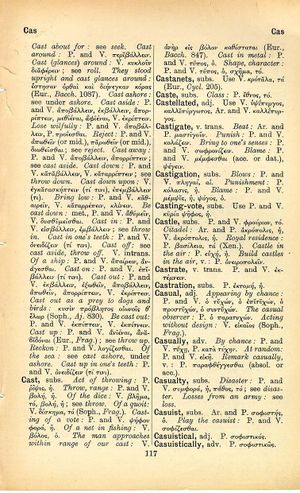castigate: Difference between revisions
Κέρδος πονηρὸν μηδέποτε βούλου λαβεῖν → Ex non honesto lucra sectari cave → Hab nie den Wunsch, unredlichen Gewinn zu ziehn
m (Text replacement - "(|thumb)\n(\|link=)" to "$1$2") |
m (Woodhouse1 replacement) |
||
| Line 1: | Line 1: | ||
{{Woodhouse1 | {{Woodhouse1 | ||
|Text=[[File:woodhouse_117.jpg|thumb|link={{filepath:woodhouse_117.jpg}}]] | |Text=[[File:woodhouse_117.jpg|thumb|link={{filepath:woodhouse_117.jpg}}]] | ||
===verb transitive=== | |||
[[beat]]: [[Aristophanes|Ar.]] and [[prose|P.]] [[μαστιγοῦν]]. | |||
[[punish]]: [[prose|P.]] and [[verse|V.]] [[κολάζειν]]. | |||
[[bring to one's senses]]: [[prose|P.]] and [[verse|V.]] [[σωφρονίζειν]]. | |||
[[blame]]: [[prose|P.]] and [[verse|V.]] [[μέμφεσθαι]] (acc. or dat.), [[ψέγειν]]. | |||
}} | }} | ||
{{Lewis | {{Lewis | ||
Revision as of 08:57, 20 May 2020
English > Greek (Woodhouse)
verb transitive
bring to one's senses: P. and V. σωφρονίζειν.
blame: P. and V. μέμφεσθαι (acc. or dat.), ψέγειν.
Latin > English (Lewis & Short)
castīgātē: adv., v. castigo.
Latin > French (Gaffiot 2016)
castīgātē (castigatus),
1 avec réserve, retenue : Sen. Rhet. Contr. 6, 8
2 d’une manière concise : Macr. Scip. 1, 6 || -tius Amm. 22, 3, 12, avec plus de réserve.
Latin > German (Georges)
castīgātē, Adv. m. Compar. (castigatus, eingeschränkt), a) in Worten knapp gehalten, kurz, haec de monade castigatius quam se copia suggerebat, Macr. somm. Scip. 1, 6, 10. – b) eingeschränkt, eingezogen, castigate vivere, Sen. exc. contr. 6, 8. § 5: castigatius vivere, Amm. 22, 3, 12: castigatius (behutsamer) agere, Amm. 31, 14, 3.
Latin > English
castigate ADV :: chastely; strictly; briefly (L+S); restrainedly, within bounds

